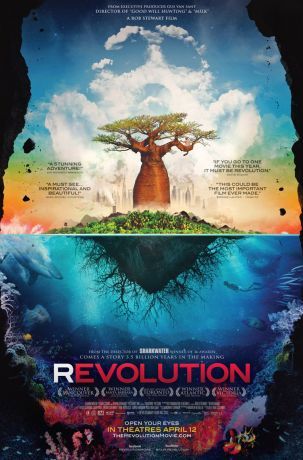Arts
You are here
Revolution puts the environmental movement on screen

April 22, 2013
The movie Revolution includes beautiful nature scenes, climate justice rallies, and interviews with activists. It shows the diversity of the natural world and the growing environmental movement to try to save our world, and ourselves.
Toronto-born filmmaker Rob Stewart's previous film, Sharkwater, helped raise awareness of the devastation caused by killing sharks for their fins. Revolution shows him promoting his previous film and getting stumped by a simple audience question: what’s the point of saving sharks if entire oceans will be dead in the next generation?
Radicalization
From a single-issue campaign, Stewart is forced to confront the systemic nature of environmental destruction, and he begins to look for answers. His quest takes him all over the world to look at nature, science, and activism. The film has striking cinematography of species underwater and on land, to show the beauty and diversity of nature, and the destruction of ocean acidification and deforestation. He interviews climate scientists, activists and members of impacted communities.
Crucially, there is a focus on Canada’s tar sands—including footage of its devastation, and interviews with activists from the Indigenous Environmental Network. Through his radicalization he joins protests for the first time—in Ottawa, Washington and Copenhagen—against polluting corporations and complicit governments.
It’s great to see activism on the silver screen, including the call for revolution to save the planet and ourselves.
Debates
But it’s unclear what he means by revolution. His movie shows the scale of environmental destruction, but neither the causes nor the solutions, and some of the views it reflects undermines its systemic critique.
Stewart targets the Canadian government, but also reinforces the view that China or “overpopulation” is the problem. He blames the tar sands and profit-driven corporations, but also says “we’re all at fault.” He discusses “overconsumption” without mentioning the biggest consumer of oil: the military. He criticizes massive bailouts for companies but doesn’t mention that those resources should go towards green jobs (even though he interviewed Van Jones).
Throughout the film, there is an abstract emphasis on a generational rather than a class divide in society, and a substitute of “awareness” for politics. Many people are fully aware of the destruction of the planet; the question is how to unite the 99% against the profit-driven 1%. In forging this unity, we can transform society and our relationship with nature. Instead Revolution ends where it began, back on single-issue reforms within the framework of capitalism.
This film will encourage you to participate in the climate justice movement and the debates within it.
If you like this article, register now for Marxism 2013: Revolution In Our Time, a weekend-long conference of ideas to change the world. Sessions include "Indigenous resistance, Idle No More and the fight against Harper", "What would it take to shut down the tar sands," "energy revolution and social revolution" and "Marx's ecology."
Section:










